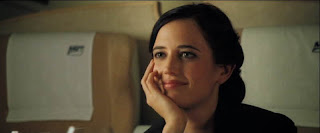This one (from Rear Window) I really don't have a comment other than I find it hilarious, not only for Thelma Ritter's performance in it—she was a great character actress (even if it only seemed like one character—"the wiseacre") who made the most comic potential out of her work without overdoing it—but for the fact that the dialog is terrific in the "don't bother me with facts" logic of it—everything ties together neatly in Rear Window's screenplay, and this speech is no exception with it's "I know what I seen" sense of certitude that the character of L.B. Jeffries will adopt later in the film (after expressing doubtfulness here). And the moral ambiguity of "peeping" is spelled out here at the beginning, because pretty soon, "peeping" is going to be an essential part of the plot, and it's going to become antithetical once Jeffries (and we) find it essential to getting answers...and stirring up trouble.
The Set-Up: L.B. Jeffries (James Stewart) is a photographer whose insistence on taking chances to get "THE shot" has left him with a broken leg and a long rehabilitation in his brownstone apartment (with courtyard). Bored, he starts staring out his window across to his neighbors, who provide endless hours of fascination, much to the disgust of his nurse, Stella McGafferty (Thelma Ritter).
Action!
INT. JEFF'S APARTMENT - DAY - MEDIUM SHOT
Jeff is seated in the foreground, in a waist shot.
Behind him, the entrance door to his apartment opens.
STELLA McGAFFERY comes in. She is a husky, unhandsome, dark-haired woman who is dressed like a district nurse, with dark coat, dark felt hat, with a white uniform showing underneath the coat. She carries a small black bag.
Stella pauses on the landing to watch Jeff. He doesn't appear to notice her entrance.
STELLA (Loud) The New York State sentence for a peeping Tom...
STELLA ...is six months in the workhouse!
He doesn't turn.
JEFF Hello Stella.
As she comes down the stairs of the landing, holding on the wrought iron railing with one hand:
STELLA And there aren't any windows in the workhouse.
She puts her bag down on a table. It is worn, and looks as if it belongs more to a fighter than a nurse. She takes off her hat coat, and hangs them on a chair.
STELLA Years ago, they used to put out your eyes with a hot poker. Is one of those bikini bombshells you always watch worth a hot poker?
He doesn't answer. She opens the bag, takes out some medical supplies: a thermometer, a stop watch, a bottle of rubbing oil, a can of powder, a towel. She talks as she works.
STELLA We've grown to be a race of peeping Toms. What people should do is stand outside their own houses and look in once in a while.
(She looks up at him)
STELLA What do you think of that for homespun philosophy?
A look at his face shows he doesn't think much of it.
JEFF Readers' Digest, April, 1939.
STELLA Well, I only quote from the best.
She takes the thermometer out of its case, shakes it down. Looks at it. Satisfied, she walks to Jeff. She swings the wheelchair around abruptly to face her.
INT. JEFF'S APARTMENT - DAY - MEDIUM SHOT
Jeff starts to protest.
JEFF Now look, Stella --
She shoves the thermometer into his mouth.
STELLA See it you can break a hundred.
As she leaves him holding the thermometer THE CAMERA PULLS BACK as she crosses to a divan. She takes a sheet from underneath, and covers the divan with it. Talking, all the time.
STELLA I shoulda been a Gypsy fortune teller, instead of an insurance company nurse. I got a nose for trouble -- can smell it ten miles away.(Stops, looks at him)
STELLA You heard of the stock market crash in '29?
Jeff nods a bored "yes."
STELLA I predicted it.
JEFF (Around thermometer) How?
INT. JEFF'S APARTMENT - DAY - SEMI-CLOSEUP
Stella stops for a moment, and looks at Jeff challengingly.
(Snaps her fingers)
INT. JEFF'S APARTMENT - DAY - CLOSEUP
INT. JEFF'S APARTMENT - DAY - CLOSEUP
Stella goes on with her work.
THE CAMERA PANS HER over to him. She takes out the thermometer, looks at it.
STELLA (Flatly) You've got a hormone deficiency.
JEFF How can you tell that from a thermometer!
STELLA Those sultry sun-worshipers you watch haven't raised your temperature one degree in four weeks.
Rear Window
Words by John Michael Hayes
Pictures by Robert Burks and Alfred Hitchcock
Rear Window is available on DVD from Universal Home Video.

































































 (Bond's smile drops)
(Bond's smile drops)

 (Transition, until later that evening.)
(Transition, until later that evening.)


































 Vesper: Beautiful.
Vesper: Beautiful.













